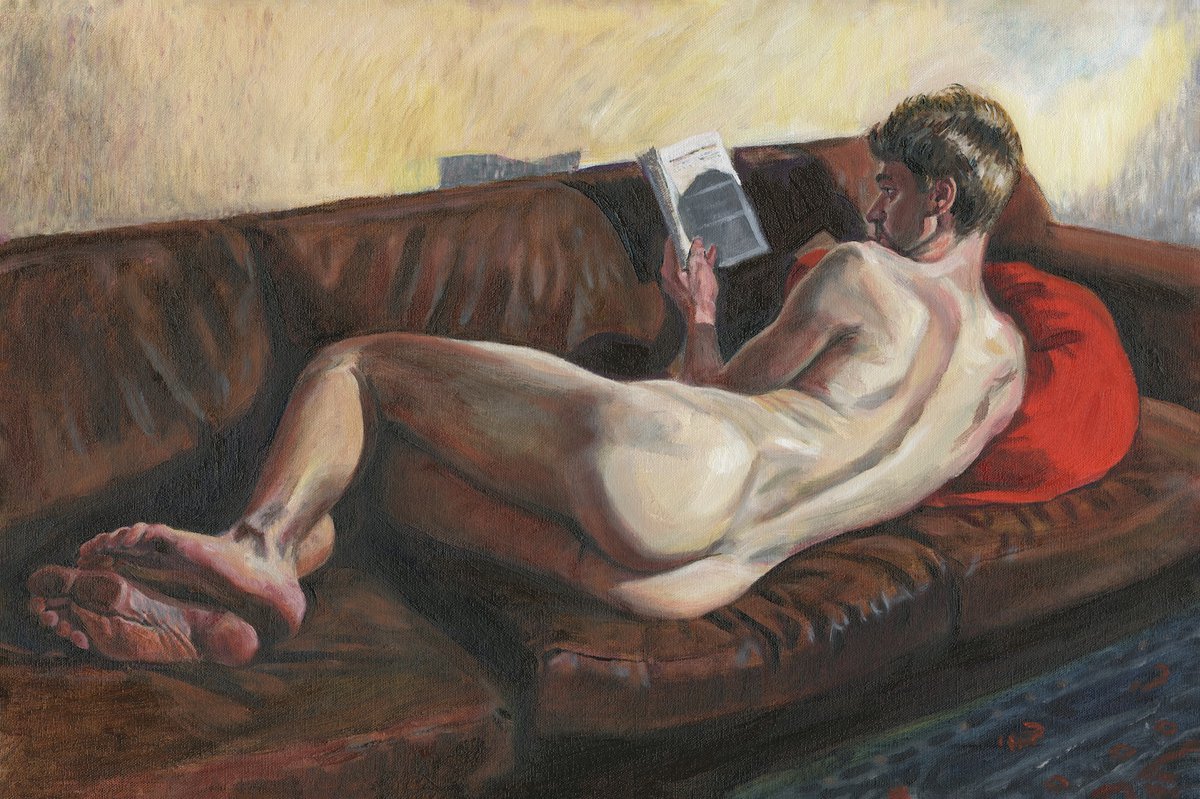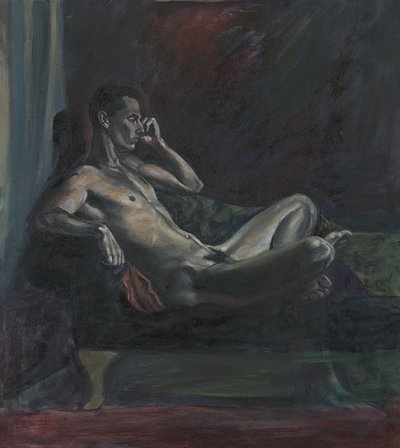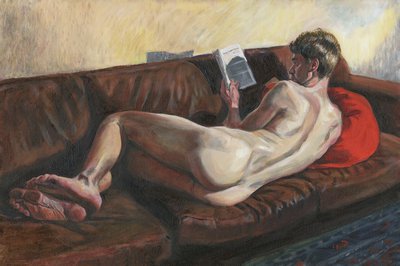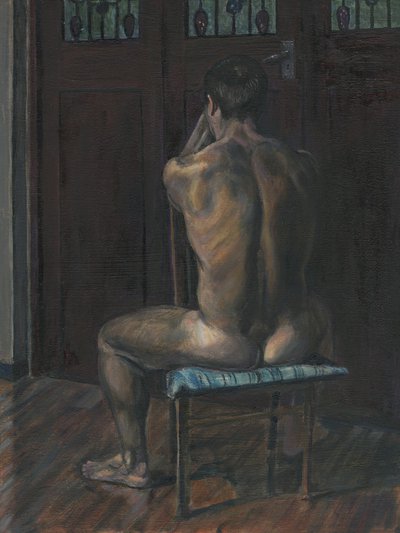An Exhibition of Male Nudes by Evan Oberholster
An exibition of male nudes by artist Evan Oberholster is currently running in the parlour room at Alexander Bar, in tandem with the delightful new play premiering at the Cape Town Fringe, the comedy The Finkelsteins are Coming to Dinner, which will also be transferring to Alexander Upstairs after Fringe. Reproductions of some of these portraits are used as props in The Finkelsteins for Andrew Laubscher's character Nate who plays an artist haunted by his dead Jewish mother.
The artworks are on sale through Alexander Bar and can be viewed freely during the regular opening hours of the bar.
Evan Oberholster, sets the nude within contemporary culture. The idea that clothes make the man has been around since the beginning of time, although it was Mark Twain who first made it a pithy saying, and went further to say that 'naked people have little or no effect on society'. This is a concept that the artist turns upside down, as he shows how society and nudity are inextricably intertwined. What Oberholster does is to deconstruct through his nude paintings of everyday people, the camouflage that clothing provides and to show how culture is not just a construct of clothing, language, belief, and behaviour. Culture exists also in nudity.
Oberholster, who has had several one-man and group exhibitions since returning in the mid-1990s to South Africa from the Netherlands, has long explored the relationship between nudity and being. This exhibition continues his work showing ordinary people in ordinary settings, all nude.
What he is doing is quite different from the trends that at present make up nude painting. This is not the grotesque distortions of the human anatomy and the human as animal that has become prevalent in contemporary art. Neither is there room in Oberholster's work for lyrical romanticisations of the human form or what he calls "the prevalence of the moody, sensual nude with blurry genitals". He does not embrace the erotic tradition that focuses on bodily perfection or the idealisation of the human form, nor the pornographic realism of some modern work, but there is certainly an underlying eroticism to the work which contradicts the deliberate mundaneness of the settings - working on the computer, having a smoke break, playing cards.
He observes wryly: "I have observed that the distinction between sexuality, sensuality and eroticism generally says more about viewer than the subject matter. Work that I have considered to be completely divested of sexuality has been viewed by others as erotic. How we see nudes reflects on our own prejudices about the naked human body."
The European influence - in terms of cultural and societal paradigms - has changed in Oberholster's work. This is South African in a way that the unclothed figure has never before been uniquely, unmistakably of our experience. The vibrancy and contradictions of the whole of South African society exists on these canvases in microcosm: tensions between heterosexuality and gay lifestyles, between black and white, between the roles of men and women.
Oberholster articulates this: "Particularly within the South African context, on a personal level, this century is characterised by a re-definition of relationships across lines of race, gender and sexuality. Although this has been an ongoing process over the last decade, I am attempting a contemporary visual representation of these changes.
"The challenge is to see the nude as a representation of contemporary culture. To articulate this visually, I have looked both at the superficial i.e. body ornamentation as in tattoos, piercings and the accoutrements of style, as well as the more substantial portrayal in the form of relationships of gender and sexuality."
The exhibition runs in the parlour room at Alexander Bar (front room on the left as you enter the bar) in tandem with the runs of the Finkelsteins are Coming to Dinner which is currently premiering at The Cape Town Fringe at City Hall until the 8th October and transfers to Alexander Upstairs from the 10th to 29th of October.
About the Artist
Evan was born in 1956 in South Africa. After completing a Fine Art degree at the University of Pretoria, he moved to Amsterdam, where he worked as an artist and illustrator.
In 1999 he returned to South Africa and held his first large solo exhibition of male nudes. He has subsequently held two solo exhibitions in Cape Town and has participated in a number of group exhibitions.
In 2001 his work formed part of Å 4000 - Å 8000, a group exhibition featuring some of South Africa's most prestigious artists, held at the Knysna Fine Art Gallery. In 2002 he was again invited to exhibit at the same gallery in an exhibition titled The Art of Colour which constituted a focal point of the Knysna Pink Loerie Festival.
Evan Oberholster's work is held in private collections in South Africa, the UK, Belgium, the Netherlands and the USA.
The artworks are on sale through Alexander Bar and can be viewed freely during the regular opening hours of the bar.
Evan Oberholster, sets the nude within contemporary culture. The idea that clothes make the man has been around since the beginning of time, although it was Mark Twain who first made it a pithy saying, and went further to say that 'naked people have little or no effect on society'. This is a concept that the artist turns upside down, as he shows how society and nudity are inextricably intertwined. What Oberholster does is to deconstruct through his nude paintings of everyday people, the camouflage that clothing provides and to show how culture is not just a construct of clothing, language, belief, and behaviour. Culture exists also in nudity.
Oberholster, who has had several one-man and group exhibitions since returning in the mid-1990s to South Africa from the Netherlands, has long explored the relationship between nudity and being. This exhibition continues his work showing ordinary people in ordinary settings, all nude.
What he is doing is quite different from the trends that at present make up nude painting. This is not the grotesque distortions of the human anatomy and the human as animal that has become prevalent in contemporary art. Neither is there room in Oberholster's work for lyrical romanticisations of the human form or what he calls "the prevalence of the moody, sensual nude with blurry genitals". He does not embrace the erotic tradition that focuses on bodily perfection or the idealisation of the human form, nor the pornographic realism of some modern work, but there is certainly an underlying eroticism to the work which contradicts the deliberate mundaneness of the settings - working on the computer, having a smoke break, playing cards.
He observes wryly: "I have observed that the distinction between sexuality, sensuality and eroticism generally says more about viewer than the subject matter. Work that I have considered to be completely divested of sexuality has been viewed by others as erotic. How we see nudes reflects on our own prejudices about the naked human body."
The European influence - in terms of cultural and societal paradigms - has changed in Oberholster's work. This is South African in a way that the unclothed figure has never before been uniquely, unmistakably of our experience. The vibrancy and contradictions of the whole of South African society exists on these canvases in microcosm: tensions between heterosexuality and gay lifestyles, between black and white, between the roles of men and women.
Oberholster articulates this: "Particularly within the South African context, on a personal level, this century is characterised by a re-definition of relationships across lines of race, gender and sexuality. Although this has been an ongoing process over the last decade, I am attempting a contemporary visual representation of these changes.
"The challenge is to see the nude as a representation of contemporary culture. To articulate this visually, I have looked both at the superficial i.e. body ornamentation as in tattoos, piercings and the accoutrements of style, as well as the more substantial portrayal in the form of relationships of gender and sexuality."
The exhibition runs in the parlour room at Alexander Bar (front room on the left as you enter the bar) in tandem with the runs of the Finkelsteins are Coming to Dinner which is currently premiering at The Cape Town Fringe at City Hall until the 8th October and transfers to Alexander Upstairs from the 10th to 29th of October.
About the Artist
Evan was born in 1956 in South Africa. After completing a Fine Art degree at the University of Pretoria, he moved to Amsterdam, where he worked as an artist and illustrator.
In 1999 he returned to South Africa and held his first large solo exhibition of male nudes. He has subsequently held two solo exhibitions in Cape Town and has participated in a number of group exhibitions.
In 2001 his work formed part of Å 4000 - Å 8000, a group exhibition featuring some of South Africa's most prestigious artists, held at the Knysna Fine Art Gallery. In 2002 he was again invited to exhibit at the same gallery in an exhibition titled The Art of Colour which constituted a focal point of the Knysna Pink Loerie Festival.
Evan Oberholster's work is held in private collections in South Africa, the UK, Belgium, the Netherlands and the USA.



